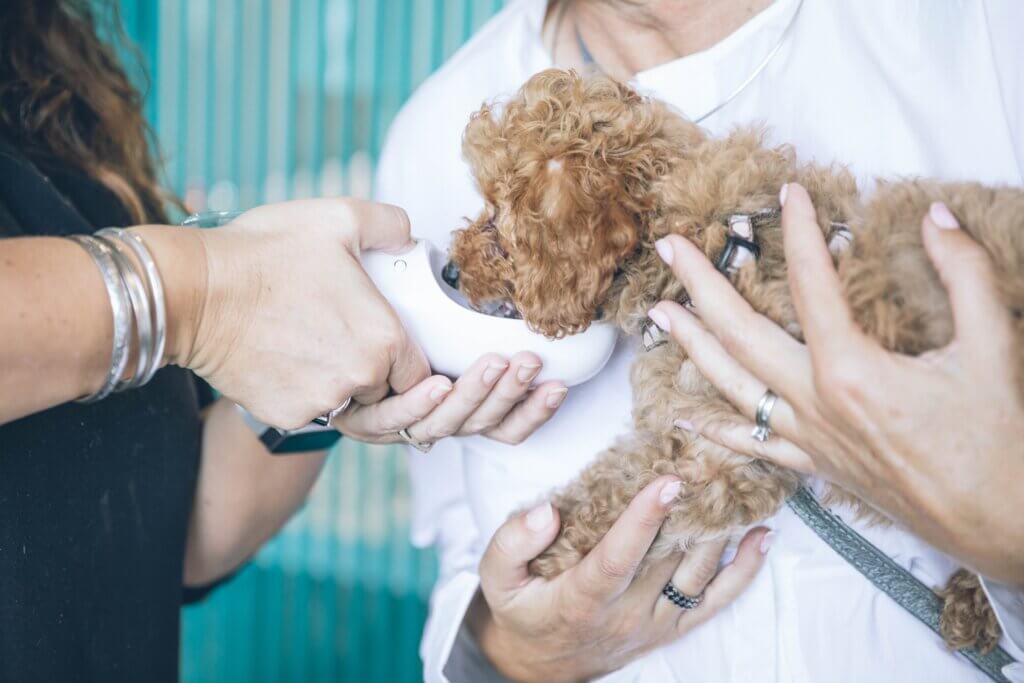
Updated: 12/08/23
There have been recent reports of concern about a possible new respiratory disease in dogs, although it is not yet clear whether there is something new causing cough in dogs. The reported signs (cough, sneeze, runny nose, +/- fever, lethargy, decreased appetite) are like what is commonly seen in dogs with infectious respiratory disease. Some dogs are reported to have very mild clinical signs, and others have more severe signs or pneumonia. Diagnostic laboratories across the country are analyzing samples from affected dogs to determine whether there is a new pathogen causing respiratory disease in dogs. The currently reported disease is suspected to be transmitted in the same way other respiratory diseases of dogs (e.g. “kennel cough”) are transmitted (close contact, airborne droplets).
Treatment is determined by the attending veterinarian based on the dog’s history, clinical signs, and results of examination and/or lab work and radiographs. Please note that if you do bring your dog to a veterinarian for cough, the staff may wear personal protective equipment (PPE) and bring your dog in to the hospital through a different entrance than usual to help prevent spreading a coughing disease to other dogs.
At this time we recommend that dog owners not worry, but exercise appropriate caution. We in conjunction with the Indiana Board of Animal Health (BOAH), have the following advice for dog owners:
- Be vigilant in monitoring your dog for signs of illness after boarding, holiday travel, or other activities where pets may have comingles with others (examples include groomer, day care, play groups, dog parks, dog shows, etc.). If your dog develops a persistent cough or lethargy, a veterinary visit is recommended.
- Make sure all dogs are up-to-date on all of their recommended vaccines including rabies, distemper combination vaccine (distemper, hepatitis, parainfluenza, parvovirus, +/- leptospirosis); and canine infectious respiratory diseases (e.g. parainfluenza, Bordetella and canine influenza).
- Reduce contact with large numbers of unknown dogs when possible. Just like with other respiratory diseases, dogs that are co-mingled may be at greater risk for developing respiratory illness.
- When possible, reduce contact with animals.
- Keep sick dogs at home whenever possible (unless taking them to the veterinarian for examination or treatment). Social settings carry an inherent risk of disease spread.
Are cats and other species affected?
At this time, to our knowledge, there are no reports of a similar problem affecting cats or other animal species.
For Veterinarians
Currently, a case definition does not exist for this condition. Most reports involve dogs with acute respiratory signs that progress rapidly over 1-3 days to severe respiratory illness while others may exhibit mild clinical signs.
Learn more about the diagnostic testing recommendations and services offered by the Purdue University Animal Disease Diagnostic Laboratory.
For more information:
- Making sense of the mystery illness found across the US (AVMA)
- Purdue Veterinarians Investigating atypical respiratory illness in dogs (Indy Star)
- Atypical Canine Respiratory Illness Case & Testing (Purdue University Animal Disease Diagnostic Laboratory)
- Oregon dealing with respiratory illness incidents in dogs (AVMA)
- Canine infectious respiratory disease complex (AVMA)
- Canine Respiratory Outbreak (New Hampshire Veterinary Diagnostic Laboratory)
- Canine respiratory disease outbreaks (Cornell University Diagnostic Laboratory)
